2024届高三英语二轮复习名词性从句总复习课件(共49张PPT)
文档属性
| 名称 | 2024届高三英语二轮复习名词性从句总复习课件(共49张PPT) |  | |
| 格式 | pptx | ||
| 文件大小 | 2.2MB | ||
| 资源类型 | 教案 | ||
| 版本资源 | 人教版(2019) | ||
| 科目 | 英语 | ||
| 更新时间 | 2023-07-04 14:19:04 | ||
图片预览

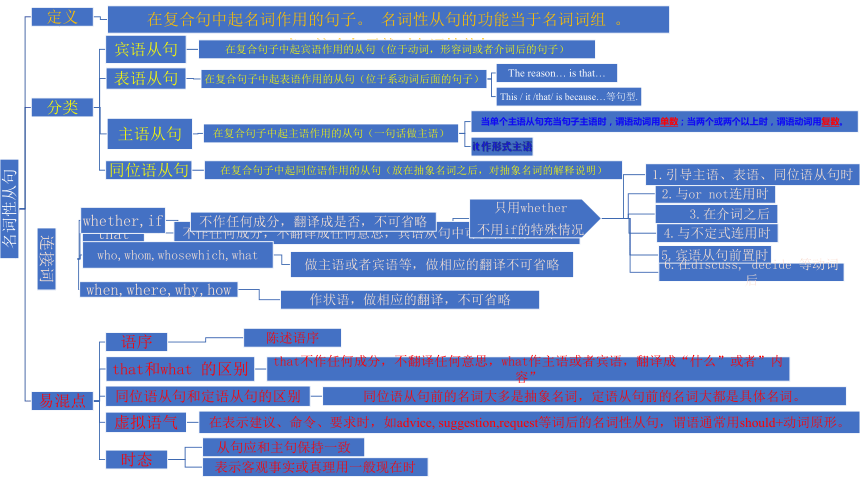

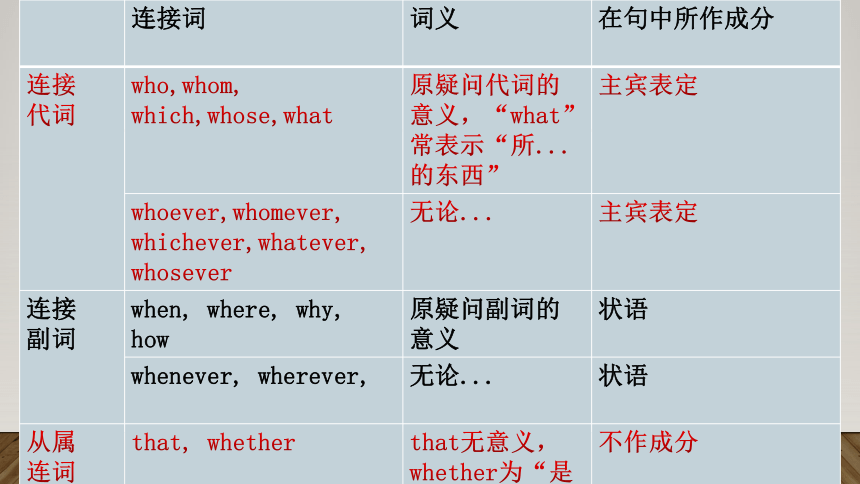

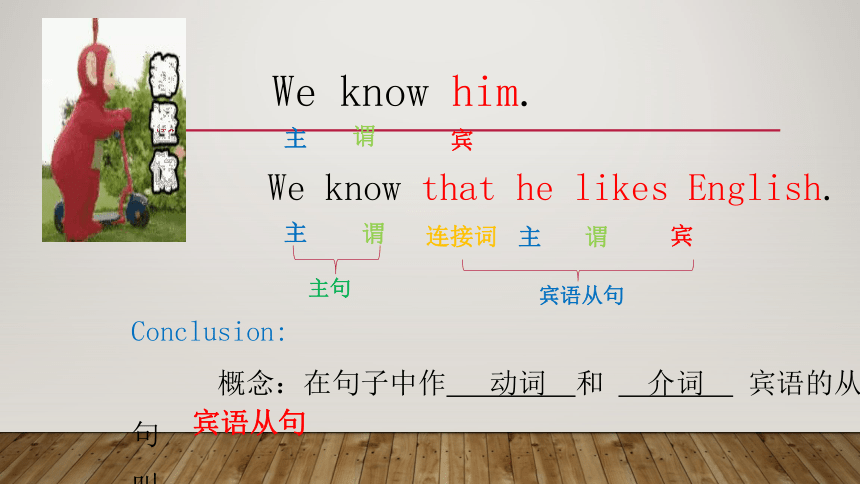

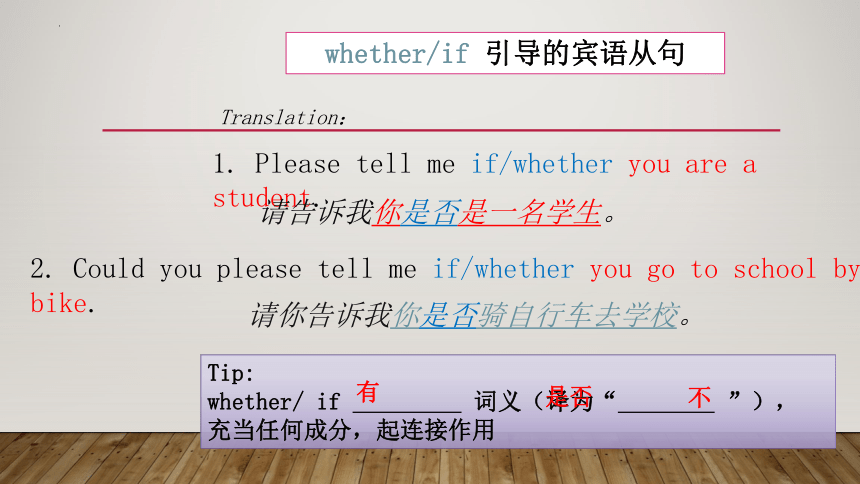

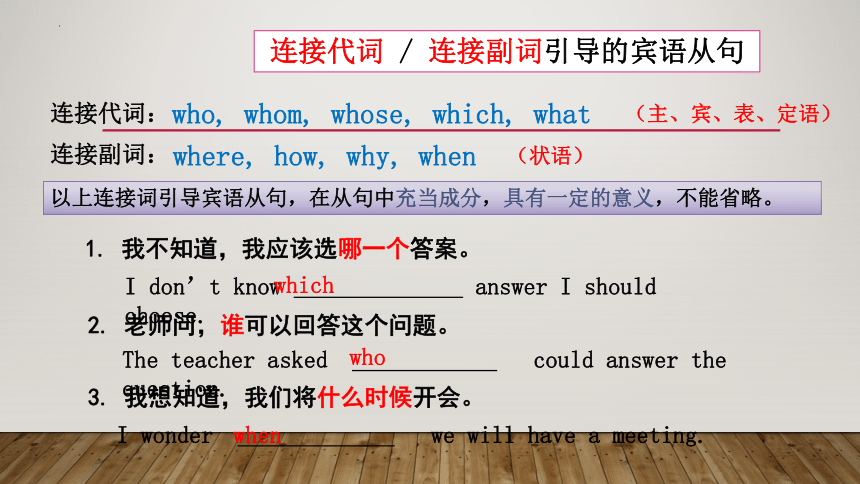


文档简介
(共49张PPT)
名词性从句总复习
Contents
1
2
3
The conception of noun clauses
名词性从句的定义
Conjunctions of noun clauses
名词性从句从句的连接词
The difficult points of noun clauses
名词性从句难点
连接词 词义 在句中所作成分
连接 代词 who,whom, which,whose,what 原疑问代词的意义,“what” 常表示“所...的东西” 主宾表定
whoever,whomever, whichever,whatever, whosever 无论... 主宾表定
连接 副词 when, where, why, how 原疑问副词的意义 状语
whenever, wherever, 无论... 状语
从属 连词 that, whether that无意义,whether为“是否” 不作成分
宾语从句
We know him.
We know that he likes English.
主
主
主
谓
谓
谓
宾
连接词
宾
宾语从句
Conclusion:
概念:在句子中作 动词 和 介词 宾语的从句
叫 。
宾语从句
主句
that 引导的宾语从句
Translation:
1. I hear that he will be back in an hour.
2. He said that he missed us very much.
我听说他将在一个小时后回来。
他说他非常想念我们。
Tip:
that 词义, 充当任何成分,只起连接作用。在口语或非正式文体中常可省略。
无
不
whether/if 引导的宾语从句
Translation:
1. Please tell me if/whether you are a student.
2. Could you please tell me if/whether you go to school by bike.
请告诉我你是否是一名学生。
请你告诉我你是否骑自行车去学校。
Tip:
whether/ if 词义(译为“ ”), 充当任何成分,起连接作用
有
是否
不
连接代词 / 连接副词引导的宾语从句
连接代词:
连接副词:
who, whom, whose, which, what
where, how, why, when
以上连接词引导宾语从句,在从句中充当成分,具有一定的意义,不能省略。
(主、宾、表、定语)
(状语)
1. 我不知道,我应该选哪一个答案。
I don’t know answer I should choose.
2. 老师问,谁可以回答这个问题。
The teacher asked could answer the question.
3. 我想知道,我们将什么时候开会。
I wonder we will have a meeting.
which
who
when
连接代词 / 连接副词引导的宾语从句
连接代词:
连接副词:
who, whom, whose, which, what
where, how, why, when
以上连接词引导宾语从句,在从句中充当成分,具有一定的意义,不能省略。
(主、宾、表、定语)
(状语)
1. 我不知道,我应该选哪一个答案。
I don’t know answer I should choose.
2. 老师问,谁可以回答这个问题。
The teacher asked could answer the question.
3. 我想知道,我们将什么时候开会。
I wonder we will have a meeting.
which
who
when
Summary
表语从句
What is predicative
表语
1)表语是用来说明主语的身份、性质、品性、特征和状态的,
2)表语常由名词、代词、数词、动词过去分词、动词的-ing形式、副词、介词短语、形容词、不定式和从句等来充当。
Linking Verbs
系动词
be动词
感官类
变化类
am, is, are, was, were
look, sound, smell, taste, feel, seem,appear
变得:become, get, turn, grow, go, fall,
保持:keep, stay, remain, hold ;
可以接表语从句系动词有:
”证明”
prove,turn out
1. The most important thing is that we finish the final task.
2. The question is whether we can finish it in such
a short time.
3. The reason why he was late is that he got up late.
(1)从属连词: that& whether
用法归纳:
a. that引导表语从句时,只起______作用,作/不作句子成分,有/没有意义。
b. whether引导表语从句时,只起______作用,作/不作句子成分,通常翻译为“______”。注意,引导表语从句时通常不用if。
连接
√
√
连接
√
是否
c. 注意下面这个结构:The reason why ... is / was that ...
主语是reason时,表语从句不能用because, 只能用that。
一、从属连词
(3)because引导的表语从句常见于"This/That/It is/was because..."句型中
e.g. He was sent to the hospital. That's because he was ill.
That's because we were in need of money at that time.
That's because…强调原因;That's why…强调结果
1) He failed the math exam. That’s __________he was too careless.
2) He was too careless. That’s ______ he failed the math exam.
because
why
名词reason作主语时,表语从句用that而不用because或why引导
The reason ____ he failed the math exam is _____ he was too careless.
that
why
(2)表语从句也可以由 as if/ as though 引导,“似乎、好像”
e.g. He looked as if he was going to cry.
It seems as though he doesn't know the answer.
as if/ as though引导的表语从句
如果是事实,就用陈述语气;
如果与事实不符,就用虚拟语气(从句表示与现在事实相反,谓语动词用一般过去式;从句表示与过去事实相反,谓语动词用had +过去分词;从句表示将来的可能性不大,用would/might/could+动词原形)。
e.g. He looks as if he were a rich man.
He looked just as if he had looked ten years before.
It looks as if it might rain.
将来事实相反as if sb would/might/could+do.
现在事实相反as if sb were/did sth.
过去事实相反 as if sb had done sth.
二、由连接代词who / whom / whose / which / what等引导的表语从句
连接代词在表语从句中可充当主语、宾语、表语或定语。依据“缺什么补什么”原则确定正确的连词。
所谓“缺什么补什么”是指从句与连词之间的关系。
如果句子中缺主语,指人用who,指物用what。
如缺宾语,指人用whom,指物用what。
如缺定语用what或which。
三.由连接副词when / where / why / how 引导的表语从句
连接副词在表语从句中充当状语,可表时间、地点、原因、方式等,因此不能省略。
依据“缺什么补什么”原则确定正确的连词。
所谓“缺什么补什么”是指从句与连词之间的关系。
如缺时间状语用when;地点状语用where。
原因状语用why;方式状语用how。
引导词
连词
关系代词
关系副词
在从句中不作成分,只起连接作用
在从句中作主宾表定语
在从句中作状语
that, whether, as if/as though, because
what, which, who(m), whose,
whatever,whichever, whoever
when, where, why, how
Summary
表示建议、命令、要求等名词后的表语从句要用虚拟语气:(should)+do
主语从句
什么是主语从句
在主从复合句中,充当主语的从句是主语从句。它是名词性从句的一种。
引导主语从句的连接词有从属连词、
连接代词和连接副词。
1. 从属连词: that;whether; if
从属
连词
that 不做成分,无意义,只起连接作用,不可省略。
whether不做成分,有意义,译为是否。
从属连词引导主语从句只起引导作用,在主语从句中不充当任何成分。
That he will pass the exam is certain.
That the earth is round is a fact.
Whether he will pass the exam is uncertain.
Whether she will win the prize is still unknown.
2. 连接代词: who;whoever;whom;
whose;what;whatever;which;whichever
连接
代词
What makes me angry is her attitude.
What we need is more time.
Which book I shall choose hasn’t been decided.
Whoever breaks the law will be punished.
连接代词 在从句中的功能
what, who, whom, wh+ever 作主、宾、表语等
which, whose 作定语
3.连接副词:when; where; how; why
连接
副词
When we will break up hasn't been decided.
Where the meeting will be held is not known.
Why he cries is not clear.
How she keeps healthy is a secret.
when在主语从句中充当时间状语。
where在主语从句中充当地点状语。
why在主语从句中充当原因状语。
how在主语从句中充当方式状语。
1.主语从句一般放在句首,但有时为了保持句子结
构平衡, 避免“头重脚轻”,常用 it 作形式主语,
而把从句放在后面。
1. That the earth moves around the sun is well known.
It is well known that the earth moves around the sun.
2. That she has made such a mistake is a pity .
It is a pity that she has made such a mistake.
3. Whether he'll come here isn't clear.
It isn't clear whether/if he'll come here.
注意:主语从句位于句首时, 不能用if 引导。
定 义
主语从句
引导词
形式主语
主谓一致
总 结
作用,位置
从属连词,连接代词,连接副词
单个主语从句-单数
多个主语从句-复数
It+be+形容词/名词短语/过去分词/不及物动词+that从句
语序
陈述语序
同位语从句
一、同位语是什么?
同位:二者有相同的地位,去掉其中一个,意思也不会变。
作用:解释,补充,说明
Sun Wukong a powerful monkey
This is Sun Wukong, a powerful monkey.
Apposition
(同位语)
Noun/ Pronoun
(名词或代词)
Summary:
通常,________ 成分是对其前面的名词进行______和 _______ 。
同位语
解释
说明
Thinking:
I heard the news that we would have two days off this week.
There is some doubt whether he is fit for the job.
I have no idea where he has gone.
She made a request that we should help her.
什么样的名词可以作为同位语从句的先行词呢?
同位语从句说明的名词大多是____________。常见的可接同位语从句的名词有:
抽象名词
消息、信息: fact, news
可能性:possibility, probability
要求:requirement, request
建议: suggestion, advice, proposal
命令:order, instruction
其他: awareness, thought, opinion
Discussion: Use conjunctions to fill the blank.
从属连词that, whether
1)He told me the news ______ he would come home from abroad soon.
2)She was in doubt _________ she had made the right decision.
3)The news came _______ the national team won the game.
that
whether
that
同位语从句可以不紧跟在其解释说明的名词后。
小结:
that : ____意义、______成分、_______省略,只起连接作用
whether: _____意义,译_____ 、______成分、____省略
无
不作
不可
有
不作
不可
只用whether引导,不用if。
“是否”
连接代词what, which, who, whom, whose
Use conjunctions to fill the blank.
1) The question what makes the matter worse puzzles me.
2) I have no idea whom my classmate is speaking with.
3) The question who should give a presentation hasn’t been decided yet.
4) He has some doubt which one I should choose.
5) She has no idea whose shoes it was.
小结:连接代词 ____意义、______成分、_______省略
有
作
不可
作主语,译为”什么”
作宾语,译为”谁”
作主语,译为”谁”
作定语,译为”哪一个”
作定语,译为”谁的”
连接副词when, where, how, why
Use conjunctions to fill the blank.
1) We have no idea how he succeeded.
2) He has solved the problem why the TV didn’t work.
3) The couple are discussing the question where they should have their honeymoon next month.
4) I have no idea when he will be back.
小结:连接副词 ____意义、______成分、_______省略
有
作
不可
作方式状语,译为”如何”
作原因状语,译为”为何”
作地点状语,译为”何地”
作时间状语,译为”何时”
that 和what 的区别
that 引导名词性从句时不充当句子成分,不需要翻译。
what 引导名词性从句要充当主语、宾语等,翻译成“什么”,“内容”,“样子”。
① _______ he said at the meeting made us angry.
② _______ he was late made the teacher angry.
③ China is no longer _______ it used to be.
what
That
What
同位语从句和定语从句的区别
定语从句是从句对其先行词或前面整个句子的 ,
类似于一个 ;
同位语从句是从句对前面抽象名词的进一步的 ,
类似于一个 。
修饰或限制
形容词
说明和解释
名词
一、从从句功能来区分:
如何区分同位语从句和定语从句
同位语从句:解释(是啥)
定语从句:限定(怎样的)
The dogs were well trained by their masters that had great experience
I'm talking about people that have stopped learning on growing
The man who lives next to us sells vegetables.
It is the news that she told me.
二、从先行词来区分:
定语从句的先行词可以是 ;
同位语从句的先行词只能是 。
任何名词
抽象名词
1)I was shocked at the fact that he was put into prison.
2)I was shocked at the fact that he told me.
他告诉我的这件事,惊呆我了。
他坐牢这件事惊呆我了。
同位语从句
定语从句
翻译:
翻译:
that在从句中是否充当成分?
that是否可以省略?
三、从关系词that的作用来区分:
同位语从句 定语从句
that只起连接作用,不充当成分 that起连接作用,充当主语或宾语
that不能省略 that作宾语可以省略
1. I have a hope that all of you will go to college.
2. I hate the fact that he told me.
3. I hate the fact that he always tells lies.
4.I will never forget the day when I joined the army.
5.We have no idea when she was born.
同位语从句
定语从句
定语从句
同位语从句
同位语从句
Practice: 判断下列同位语从句和定语从句
虚 拟 语 气
在表示要求、建议(想法)、命令的名词后面,同位语从句用虚拟语气:
这些名词后面同位语从句要用虚拟语气:should + 动词原形,should 可省略
! 特别注意: 要、建、命
特殊规则:特定名词+that+(should)do结构
用法归纳:
表示___________________(advise, suggestion, request, proposal, idea, demand,order) 等后面的表语,那么表语从句应该用虚拟语气,即谓语动词用“should + 动词原形”,should可省略。
建议,要求,命令
1. My advice is that you (should) think it over before you make a decision.
My suggestion is that we all ___________ (take) an active part in
the coming sports meet.
2. His proposal was that the work _________________ (finish) in
five hours.
(should) take
(should) be finished
时 态
时 态
1. 当主句是 一般现在时,从句根据实际情况使用任何时态。
The headmaster hopes that everything ( go) well.
I don’t think it ( rain ) tomorrow.
2. 当主句是 一般过去时,从句用过去的某种时态。
He said that he (be) worried about his son.
(一般过去时、过去完成时、
过去进行时、过去将来时)
3. 当从句表示的是一个客观真理或者不变的事实时,宾从用一般现在时。
The teacher told us that light (travel) faster than sound.
goes
will rain
was
travels
Practice Makes Perfect
The city is no longer ______ it was ten years ago.
_______surprised me most was _____ he spoke Spanish so fluently.
Liberty means responsibility. That is________ most men dread it.
The only reason for my coming is __________ I hoped to see you again.
From space, the earth looks blue. This is _______ about seventy-one percent of its surface is covered by water.
6.She looks _______ she were ill.
what
what
that
as if
why
because
that
用适当的词填空。
1. It all depends on they will support us.
2. Everyone knew Andy was a famous writer, but no one knew she came from.
3. I don’t know they want to buy.
4. I know that he (join) the Party last year.
5. I wonder where they ( go) tomorrow.
6. The teacher wanted to know how you (get) along with your classmates.
whether
that
where
what
joined
will go
got
As long as you love me
Although loneliness has always been a friend of mine,
I'm leaving my life in your hands.
People say I'm crazy and ______ I am blind.
Risking it all in a glance.
______ you got me blind is still a mystery.
I can't get you out of my head.
Don't care ______ is written in your history.
As long as you're here with me.
I don't care _____ you are.
_____ you're from.
_____ you did.
As long as you love me.
that
How
what
who
where
what
名词性从句总复习
Contents
1
2
3
The conception of noun clauses
名词性从句的定义
Conjunctions of noun clauses
名词性从句从句的连接词
The difficult points of noun clauses
名词性从句难点
连接词 词义 在句中所作成分
连接 代词 who,whom, which,whose,what 原疑问代词的意义,“what” 常表示“所...的东西” 主宾表定
whoever,whomever, whichever,whatever, whosever 无论... 主宾表定
连接 副词 when, where, why, how 原疑问副词的意义 状语
whenever, wherever, 无论... 状语
从属 连词 that, whether that无意义,whether为“是否” 不作成分
宾语从句
We know him.
We know that he likes English.
主
主
主
谓
谓
谓
宾
连接词
宾
宾语从句
Conclusion:
概念:在句子中作 动词 和 介词 宾语的从句
叫 。
宾语从句
主句
that 引导的宾语从句
Translation:
1. I hear that he will be back in an hour.
2. He said that he missed us very much.
我听说他将在一个小时后回来。
他说他非常想念我们。
Tip:
that 词义, 充当任何成分,只起连接作用。在口语或非正式文体中常可省略。
无
不
whether/if 引导的宾语从句
Translation:
1. Please tell me if/whether you are a student.
2. Could you please tell me if/whether you go to school by bike.
请告诉我你是否是一名学生。
请你告诉我你是否骑自行车去学校。
Tip:
whether/ if 词义(译为“ ”), 充当任何成分,起连接作用
有
是否
不
连接代词 / 连接副词引导的宾语从句
连接代词:
连接副词:
who, whom, whose, which, what
where, how, why, when
以上连接词引导宾语从句,在从句中充当成分,具有一定的意义,不能省略。
(主、宾、表、定语)
(状语)
1. 我不知道,我应该选哪一个答案。
I don’t know answer I should choose.
2. 老师问,谁可以回答这个问题。
The teacher asked could answer the question.
3. 我想知道,我们将什么时候开会。
I wonder we will have a meeting.
which
who
when
连接代词 / 连接副词引导的宾语从句
连接代词:
连接副词:
who, whom, whose, which, what
where, how, why, when
以上连接词引导宾语从句,在从句中充当成分,具有一定的意义,不能省略。
(主、宾、表、定语)
(状语)
1. 我不知道,我应该选哪一个答案。
I don’t know answer I should choose.
2. 老师问,谁可以回答这个问题。
The teacher asked could answer the question.
3. 我想知道,我们将什么时候开会。
I wonder we will have a meeting.
which
who
when
Summary
表语从句
What is predicative
表语
1)表语是用来说明主语的身份、性质、品性、特征和状态的,
2)表语常由名词、代词、数词、动词过去分词、动词的-ing形式、副词、介词短语、形容词、不定式和从句等来充当。
Linking Verbs
系动词
be动词
感官类
变化类
am, is, are, was, were
look, sound, smell, taste, feel, seem,appear
变得:become, get, turn, grow, go, fall,
保持:keep, stay, remain, hold ;
可以接表语从句系动词有:
”证明”
prove,turn out
1. The most important thing is that we finish the final task.
2. The question is whether we can finish it in such
a short time.
3. The reason why he was late is that he got up late.
(1)从属连词: that& whether
用法归纳:
a. that引导表语从句时,只起______作用,作/不作句子成分,有/没有意义。
b. whether引导表语从句时,只起______作用,作/不作句子成分,通常翻译为“______”。注意,引导表语从句时通常不用if。
连接
√
√
连接
√
是否
c. 注意下面这个结构:The reason why ... is / was that ...
主语是reason时,表语从句不能用because, 只能用that。
一、从属连词
(3)because引导的表语从句常见于"This/That/It is/was because..."句型中
e.g. He was sent to the hospital. That's because he was ill.
That's because we were in need of money at that time.
That's because…强调原因;That's why…强调结果
1) He failed the math exam. That’s __________he was too careless.
2) He was too careless. That’s ______ he failed the math exam.
because
why
名词reason作主语时,表语从句用that而不用because或why引导
The reason ____ he failed the math exam is _____ he was too careless.
that
why
(2)表语从句也可以由 as if/ as though 引导,“似乎、好像”
e.g. He looked as if he was going to cry.
It seems as though he doesn't know the answer.
as if/ as though引导的表语从句
如果是事实,就用陈述语气;
如果与事实不符,就用虚拟语气(从句表示与现在事实相反,谓语动词用一般过去式;从句表示与过去事实相反,谓语动词用had +过去分词;从句表示将来的可能性不大,用would/might/could+动词原形)。
e.g. He looks as if he were a rich man.
He looked just as if he had looked ten years before.
It looks as if it might rain.
将来事实相反as if sb would/might/could+do.
现在事实相反as if sb were/did sth.
过去事实相反 as if sb had done sth.
二、由连接代词who / whom / whose / which / what等引导的表语从句
连接代词在表语从句中可充当主语、宾语、表语或定语。依据“缺什么补什么”原则确定正确的连词。
所谓“缺什么补什么”是指从句与连词之间的关系。
如果句子中缺主语,指人用who,指物用what。
如缺宾语,指人用whom,指物用what。
如缺定语用what或which。
三.由连接副词when / where / why / how 引导的表语从句
连接副词在表语从句中充当状语,可表时间、地点、原因、方式等,因此不能省略。
依据“缺什么补什么”原则确定正确的连词。
所谓“缺什么补什么”是指从句与连词之间的关系。
如缺时间状语用when;地点状语用where。
原因状语用why;方式状语用how。
引导词
连词
关系代词
关系副词
在从句中不作成分,只起连接作用
在从句中作主宾表定语
在从句中作状语
that, whether, as if/as though, because
what, which, who(m), whose,
whatever,whichever, whoever
when, where, why, how
Summary
表示建议、命令、要求等名词后的表语从句要用虚拟语气:(should)+do
主语从句
什么是主语从句
在主从复合句中,充当主语的从句是主语从句。它是名词性从句的一种。
引导主语从句的连接词有从属连词、
连接代词和连接副词。
1. 从属连词: that;whether; if
从属
连词
that 不做成分,无意义,只起连接作用,不可省略。
whether不做成分,有意义,译为是否。
从属连词引导主语从句只起引导作用,在主语从句中不充当任何成分。
That he will pass the exam is certain.
That the earth is round is a fact.
Whether he will pass the exam is uncertain.
Whether she will win the prize is still unknown.
2. 连接代词: who;whoever;whom;
whose;what;whatever;which;whichever
连接
代词
What makes me angry is her attitude.
What we need is more time.
Which book I shall choose hasn’t been decided.
Whoever breaks the law will be punished.
连接代词 在从句中的功能
what, who, whom, wh+ever 作主、宾、表语等
which, whose 作定语
3.连接副词:when; where; how; why
连接
副词
When we will break up hasn't been decided.
Where the meeting will be held is not known.
Why he cries is not clear.
How she keeps healthy is a secret.
when在主语从句中充当时间状语。
where在主语从句中充当地点状语。
why在主语从句中充当原因状语。
how在主语从句中充当方式状语。
1.主语从句一般放在句首,但有时为了保持句子结
构平衡, 避免“头重脚轻”,常用 it 作形式主语,
而把从句放在后面。
1. That the earth moves around the sun is well known.
It is well known that the earth moves around the sun.
2. That she has made such a mistake is a pity .
It is a pity that she has made such a mistake.
3. Whether he'll come here isn't clear.
It isn't clear whether/if he'll come here.
注意:主语从句位于句首时, 不能用if 引导。
定 义
主语从句
引导词
形式主语
主谓一致
总 结
作用,位置
从属连词,连接代词,连接副词
单个主语从句-单数
多个主语从句-复数
It+be+形容词/名词短语/过去分词/不及物动词+that从句
语序
陈述语序
同位语从句
一、同位语是什么?
同位:二者有相同的地位,去掉其中一个,意思也不会变。
作用:解释,补充,说明
Sun Wukong a powerful monkey
This is Sun Wukong, a powerful monkey.
Apposition
(同位语)
Noun/ Pronoun
(名词或代词)
Summary:
通常,________ 成分是对其前面的名词进行______和 _______ 。
同位语
解释
说明
Thinking:
I heard the news that we would have two days off this week.
There is some doubt whether he is fit for the job.
I have no idea where he has gone.
She made a request that we should help her.
什么样的名词可以作为同位语从句的先行词呢?
同位语从句说明的名词大多是____________。常见的可接同位语从句的名词有:
抽象名词
消息、信息: fact, news
可能性:possibility, probability
要求:requirement, request
建议: suggestion, advice, proposal
命令:order, instruction
其他: awareness, thought, opinion
Discussion: Use conjunctions to fill the blank.
从属连词that, whether
1)He told me the news ______ he would come home from abroad soon.
2)She was in doubt _________ she had made the right decision.
3)The news came _______ the national team won the game.
that
whether
that
同位语从句可以不紧跟在其解释说明的名词后。
小结:
that : ____意义、______成分、_______省略,只起连接作用
whether: _____意义,译_____ 、______成分、____省略
无
不作
不可
有
不作
不可
只用whether引导,不用if。
“是否”
连接代词what, which, who, whom, whose
Use conjunctions to fill the blank.
1) The question what makes the matter worse puzzles me.
2) I have no idea whom my classmate is speaking with.
3) The question who should give a presentation hasn’t been decided yet.
4) He has some doubt which one I should choose.
5) She has no idea whose shoes it was.
小结:连接代词 ____意义、______成分、_______省略
有
作
不可
作主语,译为”什么”
作宾语,译为”谁”
作主语,译为”谁”
作定语,译为”哪一个”
作定语,译为”谁的”
连接副词when, where, how, why
Use conjunctions to fill the blank.
1) We have no idea how he succeeded.
2) He has solved the problem why the TV didn’t work.
3) The couple are discussing the question where they should have their honeymoon next month.
4) I have no idea when he will be back.
小结:连接副词 ____意义、______成分、_______省略
有
作
不可
作方式状语,译为”如何”
作原因状语,译为”为何”
作地点状语,译为”何地”
作时间状语,译为”何时”
that 和what 的区别
that 引导名词性从句时不充当句子成分,不需要翻译。
what 引导名词性从句要充当主语、宾语等,翻译成“什么”,“内容”,“样子”。
① _______ he said at the meeting made us angry.
② _______ he was late made the teacher angry.
③ China is no longer _______ it used to be.
what
That
What
同位语从句和定语从句的区别
定语从句是从句对其先行词或前面整个句子的 ,
类似于一个 ;
同位语从句是从句对前面抽象名词的进一步的 ,
类似于一个 。
修饰或限制
形容词
说明和解释
名词
一、从从句功能来区分:
如何区分同位语从句和定语从句
同位语从句:解释(是啥)
定语从句:限定(怎样的)
The dogs were well trained by their masters that had great experience
I'm talking about people that have stopped learning on growing
The man who lives next to us sells vegetables.
It is the news that she told me.
二、从先行词来区分:
定语从句的先行词可以是 ;
同位语从句的先行词只能是 。
任何名词
抽象名词
1)I was shocked at the fact that he was put into prison.
2)I was shocked at the fact that he told me.
他告诉我的这件事,惊呆我了。
他坐牢这件事惊呆我了。
同位语从句
定语从句
翻译:
翻译:
that在从句中是否充当成分?
that是否可以省略?
三、从关系词that的作用来区分:
同位语从句 定语从句
that只起连接作用,不充当成分 that起连接作用,充当主语或宾语
that不能省略 that作宾语可以省略
1. I have a hope that all of you will go to college.
2. I hate the fact that he told me.
3. I hate the fact that he always tells lies.
4.I will never forget the day when I joined the army.
5.We have no idea when she was born.
同位语从句
定语从句
定语从句
同位语从句
同位语从句
Practice: 判断下列同位语从句和定语从句
虚 拟 语 气
在表示要求、建议(想法)、命令的名词后面,同位语从句用虚拟语气:
这些名词后面同位语从句要用虚拟语气:should + 动词原形,should 可省略
! 特别注意: 要、建、命
特殊规则:特定名词+that+(should)do结构
用法归纳:
表示___________________(advise, suggestion, request, proposal, idea, demand,order) 等后面的表语,那么表语从句应该用虚拟语气,即谓语动词用“should + 动词原形”,should可省略。
建议,要求,命令
1. My advice is that you (should) think it over before you make a decision.
My suggestion is that we all ___________ (take) an active part in
the coming sports meet.
2. His proposal was that the work _________________ (finish) in
five hours.
(should) take
(should) be finished
时 态
时 态
1. 当主句是 一般现在时,从句根据实际情况使用任何时态。
The headmaster hopes that everything ( go) well.
I don’t think it ( rain ) tomorrow.
2. 当主句是 一般过去时,从句用过去的某种时态。
He said that he (be) worried about his son.
(一般过去时、过去完成时、
过去进行时、过去将来时)
3. 当从句表示的是一个客观真理或者不变的事实时,宾从用一般现在时。
The teacher told us that light (travel) faster than sound.
goes
will rain
was
travels
Practice Makes Perfect
The city is no longer ______ it was ten years ago.
_______surprised me most was _____ he spoke Spanish so fluently.
Liberty means responsibility. That is________ most men dread it.
The only reason for my coming is __________ I hoped to see you again.
From space, the earth looks blue. This is _______ about seventy-one percent of its surface is covered by water.
6.She looks _______ she were ill.
what
what
that
as if
why
because
that
用适当的词填空。
1. It all depends on they will support us.
2. Everyone knew Andy was a famous writer, but no one knew she came from.
3. I don’t know they want to buy.
4. I know that he (join) the Party last year.
5. I wonder where they ( go) tomorrow.
6. The teacher wanted to know how you (get) along with your classmates.
whether
that
where
what
joined
will go
got
As long as you love me
Although loneliness has always been a friend of mine,
I'm leaving my life in your hands.
People say I'm crazy and ______ I am blind.
Risking it all in a glance.
______ you got me blind is still a mystery.
I can't get you out of my head.
Don't care ______ is written in your history.
As long as you're here with me.
I don't care _____ you are.
_____ you're from.
_____ you did.
As long as you love me.
that
How
what
who
where
what
